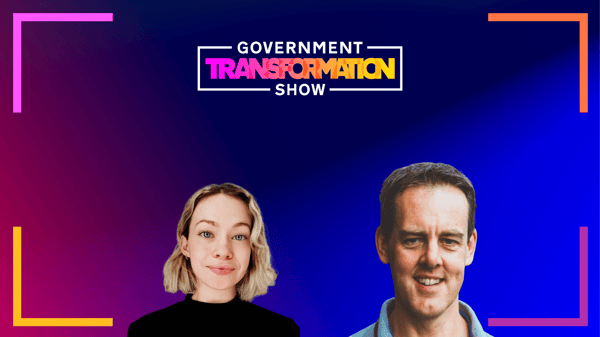Creating a successful data-handling culture in Government
Creating and maintaining an effective data-driven culture and capability remains a challenge for most of the public sector. On one hand, siloed departments and lack of interoperability prevent leaders from maximising the potential of the vast amounts of data they hold. On the other hand, a fragile trust with citizens on how data is handled and used can also hamper its use.
How DDaT leaders can tackle these challenges was the focus of a Government Data Show panel with three government executives from the UK and Canada and moderated by Government Transformation’s GM for Government, David Wilde.
In data we trust
A clear lesson from the pandemic has been that, if governments want to tackle problems effectively and quickly, sharing quality data in a timely fashion is an essential requirement. Ima Okonny, Chief Data Officer at the Government of Canada’s Employment and Social Development Department, said that organisations should strike the right balance between risk mitigation and value creation while keeping trust at the core.
“Covid-19 showed us that we need to be able to share data and share data in a way that's trusted, in a way that’s governed and in a way that adds value into policy insights and delivery insights that we needed to meet the needs of people across the globe,” Okonny added.
In practice, this translates into engaging with the public to inform about how data is being shared and the reasons for it, making sure that privacy regulations are always respected and avoiding data breaches.
Risk of illicit data exposure and lack of communication with the public can be fatal when building trust with the public, said Issi Saumtally, Chief Data Officer at the UK Cabinet Office: “trust is quite often earned but easily lost,” he noted.
Trust is quite often earned but easily lost.
In December 2019, the Cabinet Office failed to use the necessary technical and organisational measures to prevent the unauthorised disclosure of the 2020 New Year Honours recipients’s addresses online, resulting in a breach of data protection legislation and a £500,000 fine.
 “In the Cabinet Office we start from a position of loss of trust, we lost trust in 2019 and we’ve been cleaning up as a result of loss of trust,” Saumtally shared with delegates at the Government Data Show.
“In the Cabinet Office we start from a position of loss of trust, we lost trust in 2019 and we’ve been cleaning up as a result of loss of trust,” Saumtally shared with delegates at the Government Data Show.
“The quality, the provenance, the transparency, the culture, the ethics… All of those things are really, really important to maintain trust. Ultimately, citizens are at the heart of it, that's why we're here as civil servants. I think it's really important that we continue to strive to achieve excellence in maintaining public trust.”
Building the right data-handling culture
How data-handling is dealt with and the culture surrounding it differ from organisation to organisation and within different teams. Whereas from a security perspective data may be perceived as a liability or a resource that needs constant protection, from a system’s angle, data professionals would usually consider it an asset. The challenge comes when trying to balance those different aspects.
“There's certainly common foundational data management that you always need in terms of ownership, quality, cataloguing, data architecture, security… all of those good things,” said Saumtally. “Tackling data-handling culture in the organisation is a combination of the compliance type practices to try and move towards an enablement and monetisation culture.”
For David Henderson, Chief Geospatial Officer at the Ordnance Survey, developing the right data-handling culture should include the involvement of stakeholders, whether these are government or commercial colleagues, citizens or users. As an example he mentioned the data principles of his organisation, which are published in the Ordnance Survey website, and that include how data can be accessed, how it is maintained and standardised, and how it is protected, governed and managed.
“By talking about those things and living within those principles, that defines the kind of data culture of the organisation,” Henderson added. “We're really passionate about those principles, instil them into our data teams and really think hard about staying true to those principles, and doing so in a way that is transparent to our customers and our stakeholders.”
Additionally, Henderson highlighted the importance of interoperability. Geospatial data is central to the work at the Ordnance Survey but it is also “the glue” for much of the information used today by the public sector. Using a common language, framework and identifiers is needed to facilitate this interoperability.
The Geospatial Commission has been working closely with the Ordnance Survey and other government publishers of geospatial data that meets the FAIR principles - namely data that is Findable, Accessible, Interoperable and Reusable.
The FAIR principles are important to foster a positive data-handling and interoperability culture particularly when data is being used for reasons that was not originally collected.
“That immediately starts to create concerns around where does the trust that you're using data appropriately fall as a provider or the user?,” Henderson said. “The more you can champion customer uses and understanding the end value of the data and the application of that, the easier it is to bake that into your culture and do good things as a result.”
At the Government of Canada, Okonny and her team are focusing on data literacy and explaining to the organisation why data is an asset and how that translates into practice.
She said: “We've really focused on doing more work like that as the Chief Data Office, reaching across the organisation, working with our statistical agency, and seeing from a practical aspect. How do we use data as a driver, as an enabler and as a utility? And then, how do we do all this while building trust with Canadians and also within the organisation.”
Okonny’s department has been working closely with Canada’s national statistical agency with data broken down in social-demographic characteristics of people receiving benefits. Having data that is consistent and coherent was essential. Although the process was not without bureaucracy, the key lesson for Okonny’s team has been the importance of bringing key stakeholders in early, whether that is operational, legal, privacy or other colleagues relevant to the mission.
“We found that it really accelerates the process because you're able to apply some of these rules upfront,” continued Okonny, adding that Canada’s big push for digital transformation is also giving momentum to data-driven work. “That is another opportunity for us to look at data sharing by design, privacy by design, legal application of data by design, and thinking through these things in a more intentional and active way.”





